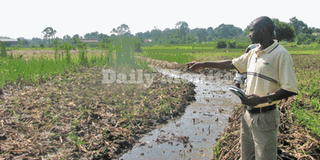Kayunga authorities halt Ssezibwa wetland giveaway

Kayunga District environment officer Edgar Basaliza inspects a degraded section of Ssezibwa wetland near Kayunga Town recently. PHOTO BY FRED MUZAALE
What you need to know:
Complaint. Kayunga authorities are worried that if Ssezibwa wetland is gifted to an investor, River Ssezibwa, which has a number of flora and fauna, will be no more.
KAYUNGA.
Authorities in Kayunga District are up in arms, protesting the proposed giveaway of Ssezibwa wetland by Uganda Land Commission (ULC) to an investor to grow sugarcane.
Authorities are worried that if Ssezibwa wetland is gifted to an investor, River Ssezibwa, which has a number of flora and fauna, will be no more.
The river stretches from Mukono and pours into Lake Kyoga. The wetland measures about 80 miles. Wetlands also purify water before running into lakes and rivers as well as absorb dangerous gases to preserve the ozone layer which in turn reduces the impacts of climate change, among others.
The ULC chairperson, Mr Baguma Isoke, had written to authorities in Kayunga District to lease the wetland that covers four districts of Mukono, Kayunga and water-stressed Nakasongola and Luweero to M/s Fakhri Enterprises Limited.
In a petition dated August 18, by the Kayunga Chief Administrative Officer (CAO), Mr Ezaruku Kazimiro to the executive director of National Environment Management (Nema), the authorities rejected the ULC proposal, saying turning a wetland into a farm land will have diverse ecological consequences for the four districts and beyond.
“As a district and lead agency of environment management, we don’t have the mandate to authorise the sale, survey and lease of any gazetted ecological resource of significance within our jurisdiction,” Mr Kazimiro’s letter reads in part.
In an earlier letter dated April 27, titled “Survey of land at Nakigoza, Bigya and Zirobwe extending in Kayunga (Ssezibwa wetland)”, Mr Isoke, wrote to the commissioner of surveys and mappings requesting him to allow a private investor, M/s Fakhri Enterprises Ltd to survey the wetland with a request to offer the investor a lease of five years extendable to 49 years.
“The ULC during its meeting of March 31 last year, under minute20/2015 (a) (2) granted your request for a five-year lease extendable to 49 years in favour of Ms Fakhri Enterprises Ltd,” Mr Isoke’s letter to the commissioner of surveys and mappings reads in part.
Explaining the importance of Ssezibwa wetland, Mr Robert Bakiika, the deputy executive director of Environmental Management for Livelihood Improvement Bwaise Facility, an non governmental organisation, said like any other marshland, Ssezibwa acts as a store and regulates flow of the water.
“And when that is destroyed, cases of flooding and silting of water bodies increases. Ssezibwa has several unique flora and fauna that will be lost if it were to be turned into a farmland,” he stressed.
Bakika warned that turning the wetland into sugar cane plantation will worsen water crisis in the cattle corridor districts of Luweero and Nakasongola where hundreds of cattle die from lack of water during the dry season.
“It is absurd that we have just committed ourselves to SDGs [UN set 17 sustainable development goals running from 2015-2030] and Paris Climate Change agreement but we are exterminating our natural resource capital as we try to fight poverty.
This is not sustainable,” Mr Bakiika said.
Attempts to talk to the owners of Fakhri Enterprises proved futile as their contact could not be established by press time.
When we visited ULC offices to meet Mr Isoke, a receptionist said he could not meet us as he was in a meeting.
When contacted yesterday, Mr Bob Nuwagira, a senior information, education and communications officer at Nema, said: “We have not even received any proposal to develop that wetland. It news to us.”
Irregular process
Mr Kazimiro insists that the process of allowing the investor to develop the wetland was “irregular” since ULC did not involve the district land board and environment office in the deal.
“Even if they (ULC) formalise the process as a district, we shall not giveaway this important natural resource,” he said.
Last year, the district authorities and police tried to evict encroachers in the wetland, who were using it to grow rice, but their efforts were frustrated by some local politicians in the area.
Bbaale County Member of Parliament George Kumama vowed not to allow any person to take the wetland and urged his constituents to remain calm.
In 2007, environmentalists under the Save Mabira Crusade mobilised Ugandans to protest the government move to give away part of Mabira forest to Mehta for sugar cane growing.
The protests left three people dead and more than eight others critically injured.
Early this month, legislators from northern Uganda threatened to mobilise against government for proposing to give Zoka forest to an investor still for sugar cane growing.




